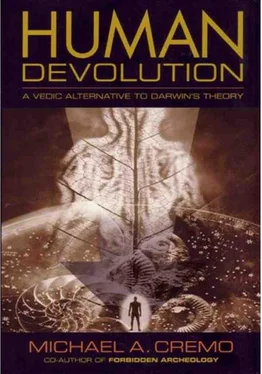Michael Cremo - Human Devolution - A Vedic Alternative To Darwin's Theory
Здесь есть возможность читать онлайн «Michael Cremo - Human Devolution - A Vedic Alternative To Darwin's Theory» весь текст электронной книги совершенно бесплатно (целиком полную версию без сокращений). В некоторых случаях можно слушать аудио, скачать через торрент в формате fb2 и присутствует краткое содержание. Год выпуска: 2003, ISBN: 2003, Издательство: Torchlight Publishing, Жанр: Старинная литература, на английском языке. Описание произведения, (предисловие) а так же отзывы посетителей доступны на портале библиотеки ЛибКат.
- Название:Human Devolution: A Vedic Alternative To Darwin's Theory
- Автор:
- Издательство:Torchlight Publishing
- Жанр:
- Год:2003
- ISBN:9780892133345
- Рейтинг книги:4 / 5. Голосов: 1
-
Избранное:Добавить в избранное
- Отзывы:
-
Ваша оценка:
- 80
- 1
- 2
- 3
- 4
- 5
Human Devolution: A Vedic Alternative To Darwin's Theory: краткое содержание, описание и аннотация
Предлагаем к чтению аннотацию, описание, краткое содержание или предисловие (зависит от того, что написал сам автор книги «Human Devolution: A Vedic Alternative To Darwin's Theory»). Если вы не нашли необходимую информацию о книге — напишите в комментариях, мы постараемся отыскать её.
Human Devolution: A Vedic Alternative To Darwin's Theory — читать онлайн бесплатно полную книгу (весь текст) целиком
Ниже представлен текст книги, разбитый по страницам. Система сохранения места последней прочитанной страницы, позволяет с удобством читать онлайн бесплатно книгу «Human Devolution: A Vedic Alternative To Darwin's Theory», без необходимости каждый раз заново искать на чём Вы остановились. Поставьте закладку, и сможете в любой момент перейти на страницу, на которой закончили чтение.
Интервал:
Закладка:
In May of 1975, Dr. R. K. Sinha, making use of this information, visited the Saptagram region of Bengal, and attempted to verify some of the details of Sharada’s life. Satinath Chatterji, a living member of the Chattopadaya family, gave a genealogy of his male ancestors in which the name of Brajesh Chattopadaya appeared. Dr. Sinha got from Chatterji further names of Brajesh Chattopadaya’s relatives and contemporaries. Returning to Nagpur, Dr. Sinha questioned Uttara, without revealing any of the new genealogical information he had obtained. Stevenson (1984, pp. 88–89) reported: “The names Sharada gave for her father, grandfather, one brother (Kailasnath), and two uncles (Devnath and Shivnath) all appear in the genealogy with the relationship she attributed to them. In addition, she told him the name of another male relative, Mathuranath, without specifying how he was related to her. The genealogy does not include the name of Srinath, one of the brothers mentioned by Sharada. His existence, however, is established in a deed of agreement for the settlement of property between Devnath, on the one hand, and Kailasnath and Srinath, on the other. The deed is dated March, 1827. This property settlement between the uncle and two nephews indicates tacitly that the nephews’ father, Brajesh, had died by March 1827, and presumably not long before the property settlement. Satinath Chatterji had another deed (also dated in 1827), which identified Mathuranath as the grandson of Shivnath, who was one of Sharada’s (presumed) uncles.”
How are Uttara’s impressions to be explained? One explanation is that she was getting this information from living sources, by a process of “super-extrasensory perception.” In other words, perhaps she had drawn on knowledge existing in the mind of Satinath Chatterji and other persons living in Bengal in the 1970s. But Stevenson pointed out that Sharada’s language abilities could not have been acquired by simple extrasensory perception. Such a skill requires actual practice for its acquisition. Stevenson (1984, pp. 160–161) therefore concluded: “Any person (or personality) demonstrating the ability to speak a language must have learned the language himself some time before the occasion of demonstrating this ability. And if we can further exclude the possibility that the person concerned did not learn the language earlier in his life, it follows that it was learned by some other personality manifesting through him. That other personality could be a previous incarnation of the person concerned or it could be a discarnate personality temporarily manifesting through the living subject—possessing the subject, we might say.” In the case of Uttara, Stevenson showed that she had not learned Bengali before the time of the manifestation of the personality of Sharada. She had learned a few words of Bengali, but did not possess the fluent command of the language demonstrated by Sharada (Stevenson 1984, pp.
134–135, 137–138, 140, 146).
Philosopher David Ray Griffin proposes that Uttara was very unhappy with her childless, husbandless life, and wanted to adopt another personality (Sharada had a husband and children). Making use of his theory of surviving mental impressions (as opposed to surviving souls with memories), he concluded that Uttara, using a superpsi faculty, selected Sharada’s memories from some cosmic reservoir of memories and constructed from them an alternate personality for herself (Griffin
1997, pp. 180–182). This does not, however, account for Uttara’s mastery of Bengali. Recollection would allow only simple repetition of things said in the past, not the ability to compose new speech. Possession of Uttara’s body by the surviving Sharada personality seems to be the most reasonable explanation.
Here is a final detail. Uttara, speaking as Sharada, recalled that she had been bitten on her right toe by a snake and had died. Uttara’s mother said that when she was pregnant with Uttara, she repeatedly dreamed that a cobra was about to bite her on the right toe. The dreams stopped upon Uttara’s birth. Uttara herself had a great fear of snakes as a child. When the personality of Sharada overtook Uttara, she would sometimes experience physical transformations suggestive of a snake bite. Her tongue and mouth became dark, and there was a black area on her toe. During one such episode she pointed to the toe and said that a king cobra had just bitten her there. Stevenson (1984, p. 112) noted: “A present-day member of the Chattopadaya family, furthermore, reports hearing that during the time of his great grandmother a female member of the family had died of a snakebite.”
Apparitions of Departed Humans
Having considered cases of communication through mediums and cases of possession as evidence for spirits of departed humans continuing to exist in some other level of a cosmic hierarchy, let us now look at cases of apparitions of departed humans. Prominent scientists have taken such cases seriously. For example, William James said: “Science may keep saying: ‘Such things are simply impossible’; yet so long as the stories multiply in different lands, and so few are positively explained away, it is bad method to ignore them. They should at least accrete for further use. As I glance back at my reading of the past few years . . . ten cases immediately rise to my mind” (Murphy and Ballou 1960, pp. 62–63). Let’s now look at a few cases. I agree with James that it is “bad method to ignore them.”
The astronomer Camille Flammarion (1909, p. 303) accepted “the possibility of communication between incarnate and discarnate spirits.” He added (1909, p. 303) that his own research had led him to conclusions favoring “the plurality of inhabited worlds . . . and the indestructibility of souls, as well as of atoms.” Flammarion’s masterpiece was Death and its mystery, a three volume compilation of evidence for the existence of the soul apart from the body and its survival after the death of the body. The book contains several apparition cases.
The following is an account of an apparition that appeared about two hours after death (Flammarion 1923, v. 3, pp. 133–136). It was recorded by Charles Tweedale of the Royal Astronomical Society of London in the english mechanic and World of Science (July 20, 1906). Tweedale recalled an incident from his boyhood. He went to bed early on the evening of January 10, 1879. He awoke and saw a form taking shape before him in the moonlight. He noticed that the moonlight was coming in from the window on the south side of his room. The form gradually became clearer until he recognized his grandmother’s face. She was wearing “an old-fashioned cap which was fluted in a shell-like design.” After a few seconds, the form gradually disappeared. At breakfast, Tweedale told his parents about his vision. His father left the table without speaking. His mother explained, “This morning your father told me that he had waked up in the night, and that he had seen his mother standing near his bed, but just at the moment when he wished to speak to her she had disappeared.” A few hours later the family received a telegram bearing the news of the death of Tweedale’s grandmother. Tweedale later learned that his father’s sister (Tweedale’s aunt) had also seen the apparition on the night of the old woman’s death. The death occurred at fifteen minutes past midnight. Tweedale’s father had noted the time of his vision as two o’clock in the morning. Tweedale himself did not have a timepiece, but from the position of the moon, he estimated that his vision had also taken place at two in the morning. The vision of Tweedale’s aunt also took place well after the reported time of death. Tweedale stated: “This proves that we are not concerned with a telepathic or subjective manifestation, occurring before death or at the very moment of death, but with a really objective apparition occurring after life had left the body. We may conclude, therefore, that the dead woman, though apparently lifeless, was sufficiently alive some hours later to manifest herself to different persons separated by considerable distances” (Flammarion 1923, v. 3, p. 135). Details of the report given by Tweedale were confirmed by his mother and his aunt’s surviving husband.
Читать дальшеИнтервал:
Закладка:
Похожие книги на «Human Devolution: A Vedic Alternative To Darwin's Theory»
Представляем Вашему вниманию похожие книги на «Human Devolution: A Vedic Alternative To Darwin's Theory» списком для выбора. Мы отобрали схожую по названию и смыслу литературу в надежде предоставить читателям больше вариантов отыскать новые, интересные, ещё непрочитанные произведения.
Обсуждение, отзывы о книге «Human Devolution: A Vedic Alternative To Darwin's Theory» и просто собственные мнения читателей. Оставьте ваши комментарии, напишите, что Вы думаете о произведении, его смысле или главных героях. Укажите что конкретно понравилось, а что нет, и почему Вы так считаете.












